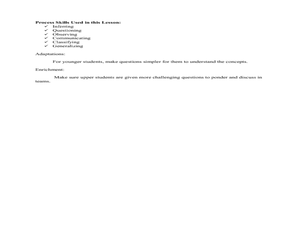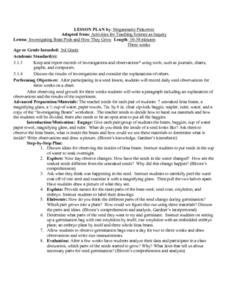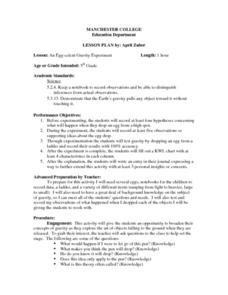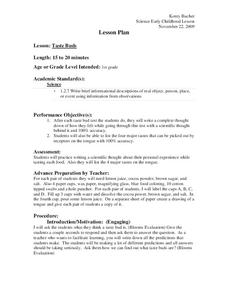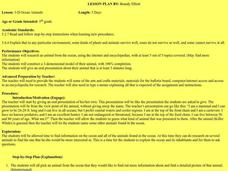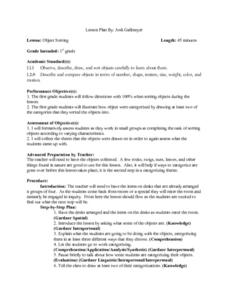Curated OER
Plants 'n' Bugs
Second graders experiment to find if pollinators have color preferences. In this plant and bug lesson, 2nd graders gather information about how flowers pollinate. Students participate in a pollination experiment using the...
Curated OER
A Day on the Farm
First graders, with a collection of various art supplies, plant a seed to observe it growing and record specific data on a data record sheet. They create a collage from various magazines of ten different foods farm animals eat and make a...
Curated OER
Heat Energy
Students study how matter changes from solids to liquids or liquids to solids. In this physical science lesson, students discuss heat energy and experiment with heat by changing a candle into a liquid using a hot plate.
Curated OER
Plant Growth
Third graders keep a journal and record the growth of their plant everyday over a two week period. With an observation written down for everyday of the week, they draw a picture of their plant in their journal on Monday and Friday...
Curated OER
Stream Table
Students build and erode a hillside. In this earth science lesson plan, students build a five inch hillside in a paint pan using sand, soil, and pebbles. They pour water over the hillside to monitor the erosion and how it is...
Curated OER
Sweat Your Socks Off
Fourth graders explore evaporation by conducting an experiment. In this water properties lesson, 4th graders examine the differences between two socks that get wet, one which is placed in front of a fan. Students discuss why...
Curated OER
Strange Sounds
Students investigate sound as a form of energy. In this energy, forces, and sound lesson plan, students explore how different sounds may be made as they make a variety of materials vibrate. Students observe the effects of vibrations and...
Curated OER
T's Alive! Or Is It?
Students explore data on the bone, muscle, and skin of living systems and then create a list of characteristics of these systems and relate these characteristics to bone, muscle, and skin.
Curated OER
Investigating Bean Pods and How They Grow
Third graders observe and create a record of seed growth over time. After planting a seed, 3rd graders record their observations of the seed's growth over a three week period. Upon conclusion of the experiment, they write a paragraph...
Curated OER
An Egg-celent Gravity Experiment
Fifth graders record at least four hypotheses concerning what happens when they drop an egg from a high spot. They record at least five observations or supporting ideas about the egg drop. Students test gravity by dropping an egg from a...
Curated OER
Food Pyramid
Third graders examine healthy eating habits by identifying the food pyramid. In this personal health instructional activity, 3rd graders discuss their own eating habits and how there should be a variety of foods in all diets. ...
Curated OER
How are Seeds Alike and Different?
Second graders examine the seeds in fresh fruit. In this seeds lesson, 2nd graders view different seeds and tell how they are alike and different. Students separate the seeds into groups according to their characteristics.
Curated OER
Taste Buds
First graders taste a variety of items and record a full sentence about the way they taste. In this taste buds lesson, 1st graders predict and then taste various items. Students draw a picture of the tongue and show the part...
Curated OER
Locating Echo
Students read the book The Adventure of Echo the Bat. In this animal science lesson, students read the book and create a chart labeled "Land Feature," "Habitat," and "Food." Students fill in the table according to where the character...
Curated OER
3-D Ocean Animals
Fifth graders research an animal from the ocean, using the internet and encyclopedias, with at least 5 out of 5 topics covered. They also construct a 3-dimensional model of their animal and give an oral presentation about their animal...
Curated OER
Go Cough Up a Lung!
Third graders examine and identify the effects smoking has on the lungs. They view and discuss pictures of a smoker's lung and a healthy lung, and read and discuss an informational handout. Students then participate in an aerobic...
Curated OER
Object Sorting
First graders follow directions when sorting objects. They illustrate how objects are categorized by drawing at least two of the categories that they sorted the objects into. Students work in small groups at completing the task of...
Curated OER
Heat Conductors
Students explore heat conductors. In this lesson on heat, students examine how heat passes through different conductors and how different materials contain heat.
Curated OER
Earth's Rotation
Fourth graders investigate the Earth's rotation. In this Earth's rotation lesson, 4th graders realize that the rotation of Earth causes the days and nights on Earth. Students break into groups and use a flashlight and a sphere to...
Curated OER
Up, Up and Away
Fourth graders design and launch rockets. In this rocket lesson, 4th graders observe the changes in outcome caused by size and fuel variables. Students navigate the NASA website to learn the parts of a rocket. Students load the...
Curated OER
What Is The Matter?
Students engage in a lesson about the scientific concept of matter. They use essential questions in order to guide the research process. Students engage in several class inquiries that are hands on in order to investigate the properties...
Curated OER
Extensions - Biology Review Unit
Students engage in a variety of activities in order to review a Biology unit. For example, they research the Bird Flu, it's history, how it is spread, what has been done about it, what better options exist for controlling or removing it....
Curated OER
Observing The Influence Of Acid Rain On Plant Growth
Students observe one of the direct effects of acid water on plant growth. Students engage in an experiment which will take about 2 weeks. Students will understand the effect that acid rain has on plant growth.
Curated OER
Solution Chemistry Investigation
High schoolers engage in a lesson that is concerned with the concepts related to solution chemistry. They calculate the molar mass of various chemical compounds. Then students predict the anion ratio for ionic compounds. High schoolers...




